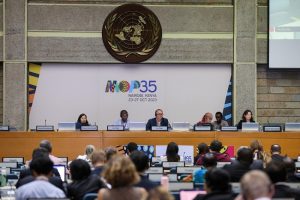Delegates at the 35th Meeting of the Parties to the Montreal Protocol on Substances that Deplete the Ozone Layer (MOP35) that held from October 22 to 27, 2023, in Nairobi, Kenya, have committed firmly to address threats to both the ozone layer and the global climate, designating a significant portion of funding to bring down global temperatures.

In what looks like an historic decision, parties adopted the largest ever replenishment of the Multilateral Fund (MLF) for the implementation of the Protocol. The replenishment, just shy of $1 billion, will assist developing countries in implementing their obligations under the Protocol and its Kigali Amendment, with a strong focus on shifting away from harmful greenhouses gases and substances with high global warming potential (GWP).
Delegates worked intensely throughout the week on a very heavy agenda. While they made progress on almost every item before them, despite best efforts, they were unable to agree on a decision to address quarantine and pre-shipment (QPS) uses of methyl bromide for which alternatives exist.
They also agreed to defer discussion on a potential roadmap to end illegal trade in controlled substances to the next meeting of the Montreal Protocol’s Open-Ended Working Group (OEWG).
Since 2023 is a replenishment year, delegates engaged in focused discussions on the MLF replenishment in closed-door negotiations throughout the week. In the final hours of the meeting, the delicate compromise reached by the contact group on the replenishment was shaken slightly when some delegations questioned the binding nature of contributions to the MLF.
But, in a spirit of compromise, parties were able to take the historic decision to support developing countries in their efforts to transition away from hydrofluorocarbons (HFCs).
Parties also adopted a host of decisions on substantive matters, including:
- stratospheric aerosol injection;
- addressing the impacts of the COVID-19 pandemic on HFC baseline consumption for certain parties;
- energy efficiency;
- very short-lived substances;
- feedstock uses of methyl bromide;
- potential areas of focus for the 2026 quadrennial reports of the Protocol’s Assessment Panels;
- the import and export of prohibited cooling equipment, to address the long-standing issue of dumping; and,
- further strengthening Protocol institutions, including for combating illegal trade.
They also took decisions on the composition of the Protocol’s Assessment Panels, as well as electing new members to the governing bodies by acclamation, avoiding a vote.
Over 600 participants attended the meeting, which was preceded by a workshop on energy efficiency on October 22.
